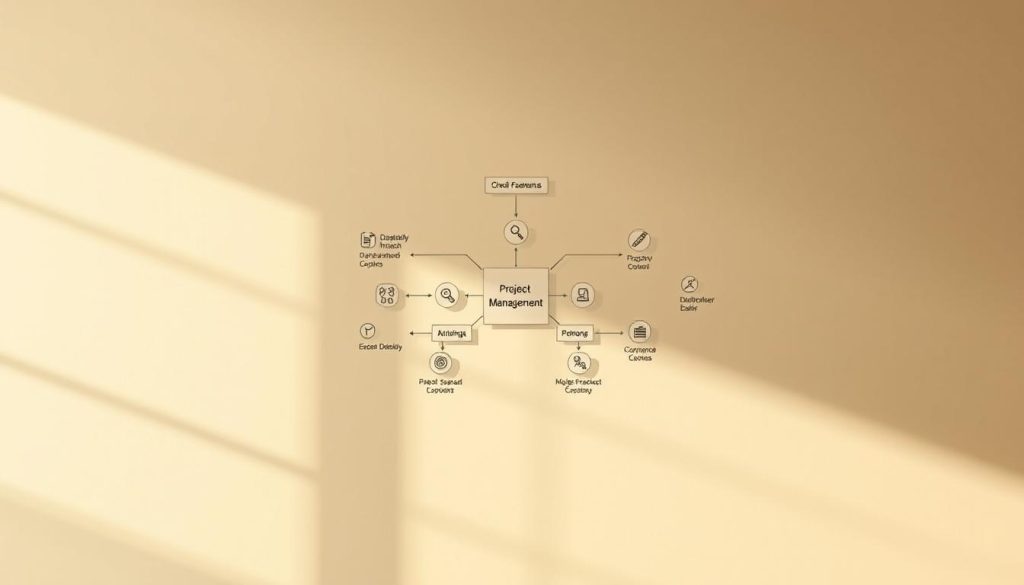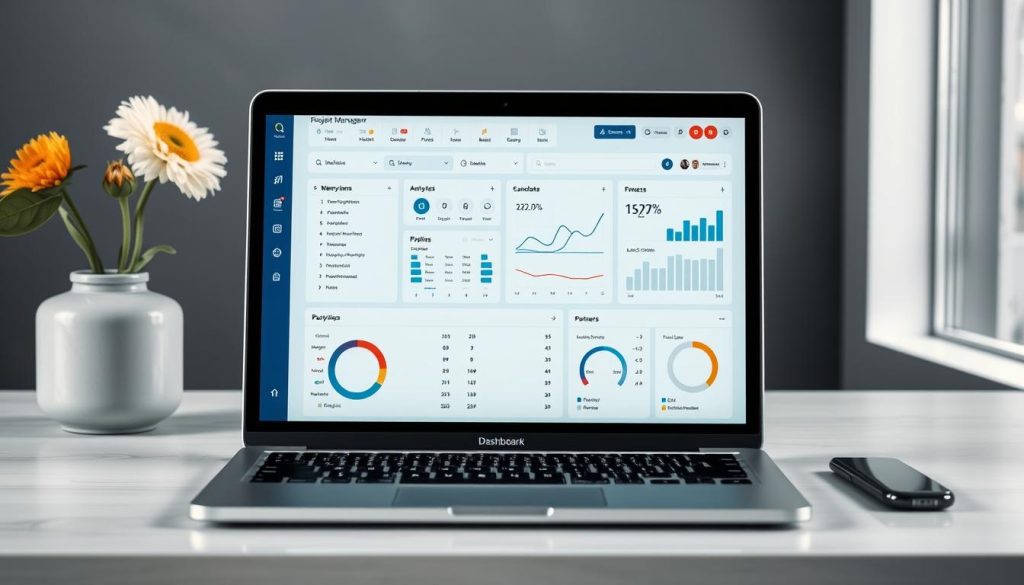Can independent professionals thrive in a business landscape dominated by project management? As the industry shifts towards a project-based model, the answer lies in understanding how to navigate this new terrain effectively.
In today’s fast-paced world, professionals are increasingly adopting independent careers, seeking stability and security. To succeed, they must develop essential management skills and adapt to the changing work environment.
By mastering the art of handling projects, independent professionals can transform their careers, achieving greater control and stability in the process. This guide will explore the strategies necessary for thriving in this dynamic industry.
Table of Contents
Key Takeaways
- Understand the shift towards a project-based economy and its implications.
- Develop essential project management skills for success.
- Build sustainable client relationships.
- Navigate the challenges of independent professional careers.
- Achieve greater professional success and stability.
Understanding the Project-Based Work Model
As the modern workforce continues to evolve, understanding the project-based work model is becoming increasingly essential for independent professionals. This approach to work organization has gained significant traction in recent years, driven by the need for flexibility and adaptability in a rapidly changing business landscape.
Definition and Key Characteristics
Project-based work refers to the practice of organizing work around specific projects with defined scopes, objectives, and deliverables. This model is characterized by its temporary nature, with a clear beginning and end, distinguishing it from traditional employment structures. The key characteristics of project-based work include a focus on specific deliverables, clear objectives, and measurable outcomes.
Differences from Traditional Employment
Unlike traditional employment models, project-based work offers greater autonomy and flexibility. Professionals operating within this model manage multiple client relationships simultaneously, often across different industries or specializations. This approach allows for a more dynamic and adaptable career path, as professionals are not limited to a single organization or role. For more insights on the differences between project-based work and traditional employment, you can explore resources such as this article that discusses the distinctions between freelance and traditional work arrangements.
Growing Trend in Today’s Economy
The project-based work model is gaining popularity due to economic shifts, technological advancements, and changing workforce preferences. This trend is driven by the need for flexibility and specialized expertise, with companies increasingly relying on a highly skilled and mobile workforce. The table below highlights the key drivers behind the growth of project-based work.
| Driver | Description | Impact |
|---|---|---|
| Economic Shifts | Changes in global economic conditions | Increased demand for flexible work arrangements |
| Technological Advancements | Improvements in communication and collaboration tools | Enhanced ability to work remotely and manage projects |
| Workforce Preferences | Shift towards autonomy and work-life balance | Greater appeal of project-based work for independent professionals |
Benefits of Project-Based Work for Independent Professionals

Project-based work offers a multitude of benefits for independent professionals, transforming the way they approach their careers. This work model provides numerous advantages that can enhance career satisfaction, financial stability, and personal growth.
Flexibility and Autonomy in Your Career
One of the primary benefits of project-based work is the flexibility and autonomy it offers. Independent professionals have unprecedented control over their schedules, workload, and client selection, allowing for a better work-life balance and the ability to align their work with personal values and lifestyle preferences. This autonomy is a significant draw for those seeking a more sustainable and fulfilling professional path.
Diverse Experience and Skill Development
Project-based work naturally expands a professional’s toolkit as each new project presents unique challenges. This diversity builds adaptability and specialized expertise simultaneously, making professionals more versatile and valuable. By taking on varied projects, independent professionals can gain diverse experience, protecting themselves against industry downturns and enhancing their career prospects.
Potential for Higher Income and Financial Independence
Successful project professionals can strategically leverage their growing experience to command premium rates and create multiple revenue streams. This potential for higher income and financial independence is a significant advantage of project-based work, allowing professionals to exceed traditional salary limitations and achieve greater financial stability.
| Benefits | Description | Advantages |
|---|---|---|
| Flexibility and Autonomy | Control over schedules, workload, and client selection | Better work-life balance, alignment with personal values |
| Diverse Experience and Skill Development | Unique challenges in each project, building adaptability and expertise | Enhanced career prospects, protection against industry downturns |
| Potential for Higher Income | Commanding premium rates, creating multiple revenue streams | Financial independence, exceeding traditional salary limitations |
For more insights on leveraging project-based work for a successful independent career, visit this resource to explore opportunities and strategies for independent professionals.
Essential Skills for Thriving in Project-Based Work
Project-based work demands a unique blend of skills, including self-management, communication, and adaptability, to ensure successful project outcomes. As an independent professional, mastering these skills is crucial for delivering projects on time, managing client expectations, and maintaining a competitive edge in the market.
Self-Management and Time Organization
Mastering self-management is foundational for project-based professionals who must function as both worker and manager, balancing multiple projects with varying deadlines and priorities. Effective time organization systems create the structure needed to deliver consistent results without the external accountability found in traditional workplaces. This involves prioritizing tasks, setting realistic milestones, and utilizing tools that enhance productivity.
Communication and Client Relationship Skills
Clear, professional communication becomes your most valuable asset when managing client expectations, negotiating project parameters, and building long-term professional relationships. Developing strong communication skills helps in articulating project goals, providing regular updates, and addressing client concerns promptly. This fosters trust and ensures that client needs are met throughout the project lifecycle.
Adaptability and Problem-Solving Abilities
Developing the adaptability required to navigate changing project requirements, unexpected obstacles, and evolving client needs is crucial. Strengthening your problem-solving abilities helps you quickly identify solutions that maintain project momentum while preserving client satisfaction and project profitability. This involves being proactive, flexible, and resourceful in the face of challenges.
| Skill | Description | Benefit |
|---|---|---|
| Self-Management | Ability to manage multiple projects and prioritize tasks | Enhanced productivity and timely project delivery |
| Communication | Clear articulation of project goals and updates | Stronger client relationships and trust |
| Adaptability | Flexibility in responding to project changes and challenges | Maintained project momentum and client satisfaction |
As emphasized by industry experts, « The key to successful project-based work lies in the ability to adapt, communicate effectively, and manage one’s time efficiently. » By focusing on these essential skills, independent professionals can enhance their project management capabilities and achieve greater success in their careers.
Building Your Project Management Framework

A well-structured project management framework is the backbone of successful project execution for independent professionals. It enables them to handle diverse projects efficiently while maintaining quality and meeting client expectations.
Before diving into the planning phase, it’s crucial to have a clear understanding of the project’s objectives, scope, and deliverables. The project objectives define what the project aims to achieve, while the scope outlines the boundaries and extent of the work involved. Deliverables are the tangible results or outcomes that the project is expected to produce.
Defining Project Scope and Deliverables
Defining the project scope with precision is critical to prevent scope creep and ensure that all deliverables meet client expectations. This involves clearly outlining what is included and excluded from the project, setting realistic boundaries, and identifying the key outcomes that will be delivered.
Creating Realistic Timelines and Milestones
Creating realistic timelines that account for the uncertainties in project work is vital. This includes building in buffer time without compromising the project’s competitiveness. By setting achievable milestones, independent professionals can track progress and make necessary adjustments.
Resource Planning and Budget Management
Resource planning is essential to accurately forecast capacity and prevent overcommitment. This involves allocating resources effectively and managing the project budget to ensure profitability while delivering value to clients.
By developing a personalized project management framework, independent professionals can maintain consistency across diverse projects. This framework serves as a roadmap, outlining the tasks, activities, and timelines required to achieve the project’s objectives, and includes the allocation of resources and establishment of milestones.
Effective Client Management Strategies
Successful project-based professionals recognize that effective client management is as important as technical expertise in building a sustainable independent career. Effective client management involves a combination of clear communication, setting realistic expectations, and adapting to client needs throughout the project lifecycle.
Clear Expectations from the Start
Setting clear expectations is foundational to successful client management. This involves creating detailed proposals, well-structured contracts, and conducting thorough kickoff meetings to align understanding. By doing so, you can ensure that both you and your client are on the same page regarding project scope, timelines, and deliverables.
Managing Client Communication and Feedback
Maintaining open and regular communication is crucial throughout the project. This includes providing regular progress updates, milestone reviews, and presenting both achievements and challenges. Effective communication helps in building trust and ensuring that clients are informed and confident in the management of their project.
Handling Scope Creep and Project Changes
Scope creep is a common challenge in project-based work. To manage this, it’s essential to identify, document, and address changes to project requirements promptly. This involves assessing the impact of changes on the project timeline and budget, and negotiating adjustments as necessary to maintain a positive client relationship.
By implementing these strategies, independent professionals can enhance client satisfaction, ensure successful project outcomes, and build a strong foundation for long-term client relationships.
Tools and Software for Independent Project Professionals

To stay competitive, independent professionals must leverage the latest project management software and tools. These digital solutions enable them to streamline their workflows, enhance collaboration, and improve project outcomes.
Project Management and Tracking Solutions
Effective project management is crucial for independent professionals to deliver high-quality results. Tools like Trello, Asana, and Basecamp offer robust project management and tracking capabilities, enabling professionals to visualize project progress, manage tasks, and coordinate deadlines.
Communication and Collaboration Platforms
Seamless communication and collaboration are vital for successful project delivery. Platforms like Slack, Microsoft Teams, and Zoom facilitate real-time communication, file sharing, and virtual meetings, ensuring that independent professionals stay connected with clients and team members.
For instance, you can find freelancers for your startup who are experienced in using these collaboration tools.
Time Tracking and Invoicing Software
Accurate time tracking and invoicing are essential for independent professionals to manage their finances effectively. Tools like Harvest, Toggl, and FreshBooks provide time tracking and invoicing capabilities, enabling professionals to monitor their productivity, generate accurate invoices, and simplify their financial management.
By leveraging these tools and software, independent professionals can enhance their productivity, improve project outcomes, and maintain a competitive edge in the market.
Building a Sustainable Project Pipeline
Establishing a consistent project pipeline is crucial for independent professionals aiming for financial stability and growth in their project-based careers. A sustainable pipeline ensures a steady flow of projects, allowing professionals to manage their workload effectively and plan for the future.
Networking Strategies for Project Professionals
Effective networking is vital for finding new project opportunities. This involves both digital and in-person approaches to connect with decision-makers who commission projects. Developing a strong network can lead to a consistent flow of new assignments and help project professionals stay ahead in their field.
Marketing Your Project Services
To stand out in a competitive market, project professionals need to develop a marketing approach that highlights their unique expertise and showcases past successes. This involves creating a compelling narrative that resonates with potential clients and differentiates you from competitors.
Fostering Long-Term Client Relationships
Transforming one-time projects into long-term client relationships is key to creating a stable foundation of repeat business. This reduces the pressure to constantly find new clients and provides a predictable income stream. Successful project professionals achieve this by delivering high-quality work and maintaining strong communication with their clients.
| Strategy | Description | Benefits |
|---|---|---|
| Networking | Connecting with decision-makers through digital and in-person events | Increased project opportunities, stronger professional network |
| Marketing | Showcasing unique expertise and past successes | Differentiation from competitors, increased client trust |
| Client Relationships | Fostering long-term relationships through quality work and communication | Repeat business, predictable income stream |
Overcoming Common Challenges in Project-Based Work
As independent professionals navigate the world of project-based work, they often encounter unique challenges that require strategic planning and adaptability. While project-based work offers many advantages, it also presents distinct obstacles that professionals must overcome to achieve success.
Managing Income Fluctuations and Financial Planning
One of the primary challenges in project-based work is managing income fluctuations. To address this, professionals can implement financial planning techniques, such as creating an emergency fund or diversifying their project assignments. By developing a robust financial plan, project managers can better navigate the feast-or-famine nature of project-based work.
Avoiding Burnout and Maintaining Work-Life Balance
Another significant challenge is avoiding burnout and maintaining a healthy work-life balance. To achieve this, professionals can adopt project scheduling approaches that protect their wellbeing, such as setting realistic timelines and milestones. For more insights on achieving a better work-life balance, you can explore resources like finding your ideal work-life balance.
Continuous Learning and Staying Relevant in Your Field
Continuous learning is crucial in project-based work, where professionals must stay relevant in their field despite the lack of employer-supported training. By investing in their own training and development, professionals can enhance their skills and remain competitive. This might involve seeking out new project opportunities or expanding their professional network to stay informed about industry trends.
By developing strategies to manage income fluctuations, avoid burnout, and stay relevant in their field, independent professionals can overcome the common challenges associated with project-based work and achieve long-term success.
Conclusion: Embracing the Future of Project-Based Work
The rise of project-based work presents both opportunities and challenges for independent professionals seeking to build sustainable, rewarding careers. As we’ve explored throughout this guide, delivering specialized expertise through well-managed projects is crucial for success in today’s economy.
By implementing the frameworks outlined in this guide, you’re positioning yourself to thrive in a results-driven economy. This involves effective project management, fostering strong client relationships, and developing a robust business strategy. Mastering project-based work is an ongoing journey that requires continuous adaptation, learning, and refinement of your approaches as markets evolve and client needs change.
- Embracing project-based work allows professionals to capitalize on new opportunities and navigate the changing workforce landscape.
- By focusing on collaboration, objectives, and deliverables, professionals can ensure successful project outcomes and build a strong reputation.
- As the workforce continues to evolve, project managers and independent professionals must remain agile and responsive to changing client needs and market conditions.
We encourage you to start implementing these strategies immediately, beginning with the areas that present your greatest challenges, and gradually building a comprehensive system that supports your unique vision for professional success.
FAQ
What are the key skills required to succeed in project-based management?
To thrive in project-based management, independent professionals need to possess a range of skills, including self-management, communication, and problem-solving abilities. These skills enable them to effectively manage their time, collaborate with clients and team members, and adapt to changing project needs.
How can I effectively manage my project scope and avoid scope creep?
To manage project scope, it’s essential to clearly define deliverables and objectives at the outset. Establishing a robust project framework and maintaining open communication with clients can help prevent scope creep and ensure that projects stay on track.
What tools and software are available to support project professionals?
Independent project professionals can leverage a range of tools and software to streamline their management processes, including project management and tracking solutions, communication and collaboration platforms, and time tracking and invoicing software.
How can I build a sustainable project pipeline and ensure a steady flow of new opportunities?
Building a sustainable project pipeline requires a strategic approach to networking, marketing, and client relationship-building. By establishing a strong professional network, developing a robust marketing strategy, and fostering long-term client relationships, independent professionals can create a steady stream of new project opportunities.
What strategies can I use to manage income fluctuations and maintain financial stability?
To manage income fluctuations, independent professionals can implement a range of financial planning strategies, including budgeting, saving, and diversifying their income streams. By maintaining a financial safety net and being proactive in their financial planning, professionals can reduce the risks associated with project-based work.
How can I maintain a healthy work-life balance and avoid burnout?
Maintaining a healthy work-life balance requires a deliberate approach to managing time, prioritizing self-care, and establishing clear boundaries between work and personal life. By setting realistic goals, taking regular breaks, and nurturing their physical and mental well-being, independent professionals can reduce the risk of burnout and maintain their overall well-being.





